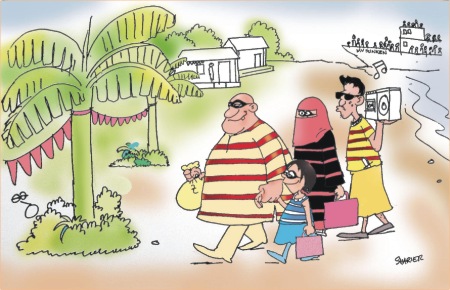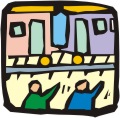
THE
residents of Bangladesh have far more holidays than they need. Just
count the number of hartals. Despite that, Eid-ul-fitr becomes a much-anticipated
holiday especially in the hearts of Bengali Muslims. Preparations
begin much earlier during Ramadan. It starts from the night of Shab-e-barat
when people start to count down the days until they can indulge in
the festivities. In the meantime, some go for hunger strike while
others actually fast. Its all a question of whether you pray during
that time and work as well or just abstain from eating and sleep all
day till iftaar.
 Thus,
a hungry nation waits eagerly for the moon sighting when they can
go back to eating whenever they want wherever they want. In between
resisting the murderous temptations, preparations are also on the
way regarding Zakat, gifts for the family, home décor, shopping
for eid clothes and avoiding eid muggers. While many stay in the cities
to spend the vacation, some go to visit their respective village homes.
Thus,
a hungry nation waits eagerly for the moon sighting when they can
go back to eating whenever they want wherever they want. In between
resisting the murderous temptations, preparations are also on the
way regarding Zakat, gifts for the family, home décor, shopping
for eid clothes and avoiding eid muggers. While many stay in the cities
to spend the vacation, some go to visit their respective village homes.
Till
the eve
It becomes a special treat for those having family in the village.
Reservations for trains, buses or launches have to be made in advance.
The village homes seem like a place in a different planet. In most
cases you will se uninterrupted horizons. It's a calm and serene place
compared to what has been left behind. The city dwellers feel as if
released from a cage.
The
village folk generally follow the religious norms a bit more carefully
than those living a hectic city life do. Fasting and the related sehri,
iftaar and tarabi prayers are followed to the letter. The young people
in the localities run around chanting in groups just before sehri
to awaken the slumbering people. Some places still do not have electricity
but that does not matter. Whether under a bright bulb or in the dim
glow of an oil lantern, sehri takes place with all members present.
You see, in the villages even young children keep fast as they often
start crying when not allowed to. During the day they go to the mosques
for reciting the verses of the Quran in accordance to what the imam
tells often with the help of a cane.
In
some localities, iftaar is announced using a siren but most people
await the imam's azaan. The menu is also different form that found
in the cities. You will find all kinds of pithas along with dried
rice, date juice and fruits. The idyllic life has its perks with time
for reflection. The Ramadan days for the village folk brings about
a completely new difference. Most people pray devoutly asking for
forgiveness and hoping for better days.
The
sighting of the moon brings about an end to the month of abstinence
and prayers. Open fields are filed with humanity waiting to catch
a glimpse of the new moon. If not sighted by the evening everyone
stays glued to the television or the radio until they hear of a sighting
somewhere in the country. It's time to bring on the fireworks in celebration.
The womenfolk stay up pretty much all the night feverishly cooking
up the dishes.
 The
day arrives
The
day arrives
The whole village wakes up with the sound of the fazr prayers. There
is always some open filed that serves as an eidgah where the people
congregate. For a moment, all distinctions are put aside as everyone
embraces not only each other but also the spirit of the biggest festival.
Children cannot wait to get their hands or rather into their new clothes.
If
the community has a good number of people then it is not unusual to
see a fair set up nearby. These consist of rides like the nagardola
along with copious amounts of candyfloss and knickknacks. In some
places the young boys hire a rickshaw with a microphone and ride around
belting out their favorite tunes. It is a lot like the city boys riding
around in their ear splitting, bass thumping CD player equipped cars.
The
women may be tending to the household all day but the evening is set
aside for their own time. Often there is an informal competition going
as the bragging continues about the items cooked and the recipes used.
The
difference between the villagers and the city dwellers can sometimes
be seen in the way of dressing. Otherwise, things are pretty much
similar. It is a day to meet with childhood playmates and reminisce
over a cup of hot tea.
Festivities
are happy times related to happy memories. Many who live in the cities
have fond remembrances of their childhood in the villages. Going back
to where it all started even for a brief moment as a respite well
deserved.
By
Sultana Yasmin
Translated by Ehsanur Raza Ronny
where
are you going?
 It
is that time of the year when the city becomes a ghost town compared
to what it usually is. No, I am not talking about a Brazil vs. Argentina
football world cup final! It is Eid day and the last 30 days of non-stop
shopping and not-so-non-stop eating has built up to quite an "anticlimactic"
ending. "Anticlimactic" because as all your friends and
family around you packed up and left for their Desher Bari, or wherever,
for their Eid holiday, you were not wise enough to plan ahead regarding
"Where to go?" and "How to get there?" Now, with
Eid day already here, as all your phone calls to every travel agency
requesting for a bus, train or even plane ticket, ends with a negative
response, you wonder if you will be lucky enough to get a yellow cab
to take you to your favorite restaurant. It is actually very simple
to avoid this particular situation. All it will take is a little planning,
some family input and for you to simply read on.
It
is that time of the year when the city becomes a ghost town compared
to what it usually is. No, I am not talking about a Brazil vs. Argentina
football world cup final! It is Eid day and the last 30 days of non-stop
shopping and not-so-non-stop eating has built up to quite an "anticlimactic"
ending. "Anticlimactic" because as all your friends and
family around you packed up and left for their Desher Bari, or wherever,
for their Eid holiday, you were not wise enough to plan ahead regarding
"Where to go?" and "How to get there?" Now, with
Eid day already here, as all your phone calls to every travel agency
requesting for a bus, train or even plane ticket, ends with a negative
response, you wonder if you will be lucky enough to get a yellow cab
to take you to your favorite restaurant. It is actually very simple
to avoid this particular situation. All it will take is a little planning,
some family input and for you to simply read on.
Your
first task is to decide "Where to go?" The way I see it,
it comes down to two very basic options. They are-
The
traditional option, i.e. your Desher Bari
It is all well and good if you think that going to your home town
is simple enough when own a reliable car. However, I must warn you
that some of the roads leading to some of your hometowns are pretty
nasty. Thanks to the recent floods, some of the roads have enough
bumps and potholes to churn any milk you might be carrying into butter.
Be sure to check up on road conditions before you start off on your
journey. They best way is to call you hometown and ask the people
over there. For those of us looking for others means of transport
than a private car, our choices are buses, trains, planes and even
steamers and ferryboats for certain destinations.
Buses
are definitely the quickest way to get around the country. However,
keep in mind that a journey in just about any ordinary bus, for e.g.
one you might get on from the Tejgaon bus station, is not for the
fainthearted. In fact, the whole process of catching a bus from the
Tejgaon station is quite a complicated one if your not used to it.
Firstly, the rush that starts from the beginning of the month of Ramadan
is insane. Most tickets are purchased on the spot, so it is not possible
to book your tickets by making a phone call. Secondly, thanks to the
rush, ticket prices eventually get hiked up to almost twice their
normal amount. It would be more advisable to use one of those "Luxurious
A/C Bus" services such as Shohag or Green Line. They provide
the option of being able to book your tickets through a telephone
call. Just to give you an idea, if you decide to travel with Shohag,
here is an overview of their general ticket prices-
A/C
Bus-Chittagong TK 300, Khulna TK 350, Jessore TK 300 and Non-A/C Bus-
Chittagong TK 190, Khulna TK 260, Jessore TK 230. These and buses
to other destinations leave daily but even then you should call at
least 15 days before your estimated departure date to book your tickets.
You can also expect prices to go up by about 10% to 20% during the
holiday rush.
 Trains
are a good alternative from buses and cars in case you find out that
the roads leading to your destination are in poor condition. Train
ticket prices do not go up officially during the holiday rush, but
they are definitely more expensive then. Provoked by excess demand
during Eid, dealers tend to buy off all tickets from before and scalp
them at higher prices later. Your best bet would be to go directly
to the station at least 2 weeks earlier and buy the tickets yourself.
Trains
are a good alternative from buses and cars in case you find out that
the roads leading to your destination are in poor condition. Train
ticket prices do not go up officially during the holiday rush, but
they are definitely more expensive then. Provoked by excess demand
during Eid, dealers tend to buy off all tickets from before and scalp
them at higher prices later. Your best bet would be to go directly
to the station at least 2 weeks earlier and buy the tickets yourself.
If
you have to go towards Barisal, then you can also choose to take a
launch or a steamer. A decent A/C cabin on a launch to Barisal will
cost you about TK 400. There is a bus called Dhanshiri that goes to
Barisal as well. Ticket prices are between TK 200 to TK 220.
The
Alternative Option, i.e. anywhere else
It is quite difficult to be able to squeeze in a decent vacation in
between the three or four days of break we get during Eid. If you
are lucky enough, Eid will fall right before or after the weekend
so you can get a combined holiday of about a week. If that is the
case, then I suggest you try out one of those "3 days, Four nights"
type offers which are going around. Not only are they offered at very
cheap rates, they also sometimes have they added advantage of providing
a booked hotel room as well. Contact just about any travel agency
and they can fill you in on these great deals.
If
you do not mind "roughing it" a bit, then you can try going
to India by road. A return ticket to Kolkata will cost you about TK
1200 on the Shohag or BRTC bus. If you are looking for a vacation
that is cheap, fun and time saving at the same time, then this option
is for you. Find Kolkata too boring? No problem! An innovative way
to have more fun would be to tour India by train. "Omni Travels"
at Gulshan South Avenue is the official sales agent of the Indian
Railways in Bangladesh. You can get train tickets to just about anywhere
in India from here. Prices range from between $70 for A/C service
to $30 for Non-A/C service.
 If
stepping out of your country's boundary during Eid is not your thing,
then consider the great tourist spots that Bangladesh has to offer.
These spots are great because it is usually comparatively inexpensive
to get there however you decide to go, you can go and come back within
two to three days and sometimes you will be amazed that places like
that exist inside Bangladesh. Two such favorite tourist hot spots
are St. Martins Island and the Madobhkundo Water falls. "Parjatan"
offer tours to both these places.
If
stepping out of your country's boundary during Eid is not your thing,
then consider the great tourist spots that Bangladesh has to offer.
These spots are great because it is usually comparatively inexpensive
to get there however you decide to go, you can go and come back within
two to three days and sometimes you will be amazed that places like
that exist inside Bangladesh. Two such favorite tourist hot spots
are St. Martins Island and the Madobhkundo Water falls. "Parjatan"
offer tours to both these places.
There
you go! By now you should be an expert at arranging and planning your
Eid holiday trip. So go ahead and start talking to you family about
where they want to go and how they want to get there. Even if you
decide to stay home, it is not a total loss. Save this article for
next year then.
By
Farhan

